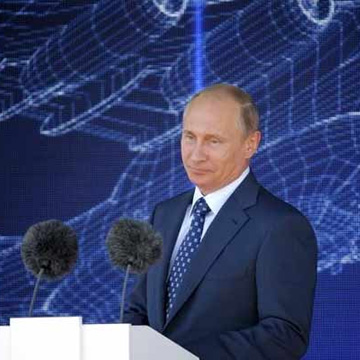 Moscow:
Moscow: The Russian parliament on Wednesday unanimously granted President Vladimir Putin the right to deploy the country's military in Syria and carry out air strikes, a move a top Kremlin aide said related only to the air force.
Russia has been building up its military presence in Syria, where it supports the government forces of President Bashar al-Assad in a conflict that pits him against Islamic State militants and Western-backed rebels.
Sergei Ivanov, the head of the Kremlin administration, said after the vote in the Federation Council, the Russian parliament's upper chamber: "It is about Syria."
He said the vote did not mean that Russian ground forces would be engaged in conflict and that the move referred to the use of the air force only.
There have some media reports from the Middle East that Russian military jets have already started carrying out air strikes in Syria. The Kremlin has declined to confirm that.
Sergei B. Ivanov, Putin’s chief of staff, appealed to the upper house, the Federation Council, for the measure, describing it as an open-ended deployment of the Russian Air Force to support Mr. Assad — at his request — in his fight against the Islamic State.
“We are going to use only the air force,” Mr. Ivanov said in remarks to a closed session of the council that were broadcast after the measure was approved unanimously, 162 to 0. The use of ground forces was “excluded,” Mr. Ivanov said, repeating what Mr. Putin has emphasized in recent weeks.
“It will be air support for the Syrian forces in their struggle with ISIS,” Mr. Ivanov said, using another term for the Islamic State.
Although approval by the Federation Council is generally considered a rubber stamp, a similar vote preceded the deployment of Russian forces in Ukraine in March 2014, including to Crimea, which Russia annexed.
The Federation Council withdrew that approval in late June 2014. After that, Russia described any soldiers fighting in southeast Ukraine as “volunteers,” although Ukraine and its Western supporters continued to accuse Russia of deploying its forces across the border.
The Russian authorization of force came just two days after Putin and President Obama met on the sidelines of the United Nations General Assembly in New York, where they clashed over Syria. Putin says Assad is a bulwark against the Islamic State, while Obama says the Syrian war cannot be resolved until Assad leaves.
Putin called for a grand international coalition to fight the Islamic State, saying in his speech at the United Nations that the world needed to support Assad and Kurdish forces fighting on the ground in order to defeat the Islamic State, much as the world fought Hitler during World War II.
But Obama emphasized that the United States wants Assad to go, a position seconded by crucial allies in the region, like Saudi Arabia.
Although the two men failed to reach an agreement on Syria, the United States and Russia are expected to try to establish some coordination for flights in the region, as Western warplanes have been flying missions against the Islamic State for a year.
For weeks, the United States said that Russia was deploying military equipment and soldiers to a Syrian airfield near Latakia. Russian officials said the cargo carriers flying to the site were delivering humanitarian aid.
Russian surveillance drones have been sighted over parts of Syria where other rebel groups are deployed, specifically those in Idlib Province that threaten Latakia. Latakia is the heart of the coastal homeland of much of the Alawite minority elite that runs Syria, including the Assad clan.
Russian drones have not been sighted over Islamic State-controlled areas in northwestern Syria, even though Ivanov said on Wednesday that Russia was mainly trying to fight the Islamic State and was not trying to expand its influence in the Middle East. Roughly 2,400 Russians are believed to have joined the Islamic State.
“We are not speaking of achieving anybody’s ambitions, as our Western partners regularly accuse us,” Ivanov said. “We are speaking exclusively about the national interests of the Russian federation.”
Russia had already said it would establish an information center in Baghdad so that Iran, Iraq and Syria could pool intelligence about the Islamic State, which controls wide stretches of territory in Iraq and Syria.
After his meeting with Obama, Putin belittled efforts by Australia, France and the United States to fight Islamic State militants. The Russian military had counted 43 strikes in Syria in 24 hours, he said.
“What is the result? Nobody knows if there is any,” Putin said. “If we set ourselves the target of resolving specific issues and achieving specific goals, this work should be coordinated in order to be successful. The center was set up to coordinate efforts. I would like to repeat that it has been set up for all who are interested in combating terrorism to join in.”
Putin said that Russia and the United States had agreed to work out appropriate measures and that “there needs to be some informational coordination.”
On Wednesday, Ivanov took pains to argue that the Western countries flying missions against the Islamic State were acting outside international law, because they did not have United Nations approval. But the Russian actions are legal, he said, because Damascus requested them.
The last time the Russian parliament granted Putin the right to deploy troops abroad, a technical requirement under Russian law, Moscow seized Crimea from Ukraine last year.
 Moscow: The Russian parliament on Wednesday unanimously granted President Vladimir Putin the right to deploy the country's military in Syria and carry out air strikes, a move a top Kremlin aide said related only to the air force.
Moscow: The Russian parliament on Wednesday unanimously granted President Vladimir Putin the right to deploy the country's military in Syria and carry out air strikes, a move a top Kremlin aide said related only to the air force.